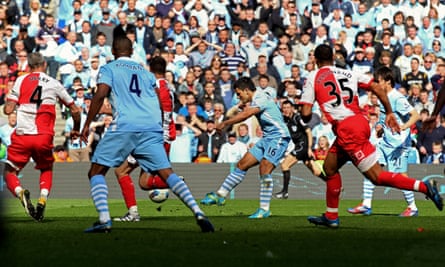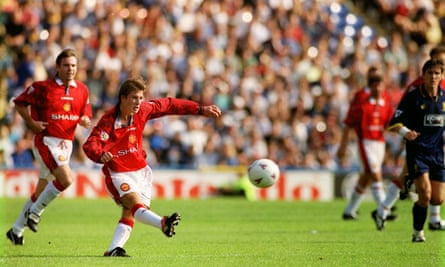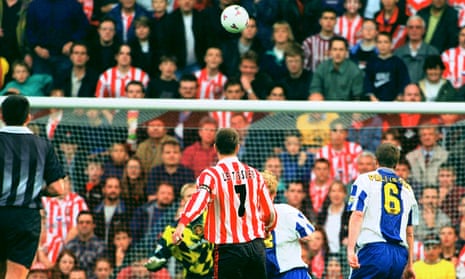The move leading up to Matt Le Tissier’s skip and jink and dreamy little chip over Peter Schmeichel for Southampton against Manchester United in October 1996 emerges out of a few moments of typical 1990s midfield helter-skelter. These days perhaps we would call this “high energy pressing”. Back then it was just sort of general football.
The goal starts from a throw-in on United’s left-wing. The ball bounces back off Jordi Cruyff as he is bumped by Jason Dodd. Eyal Berkovic, still looking a bit wired after scoring the opener half an hour earlier, skitters in and nips the ball away from Phil Neville. Egil Ostenstad lays it to Berkovic, who fizzes a hard, flat pass to Le Tissier 40 yards from goal. Le Tissier looks up. There are four United players in front of him. From here it will take six seconds and five touches to put the ball in the net.
Trying to pick out the best goal in 25 years of top-tier football is, of course, a laughably subjective task, skewed not just by the reductive inanity of trying to rank various types of impossibly rarefied skill but by issues of context. In isolation nothing is likely to outshine, say, Dalian Atkinson’s bullocking all-comers run and chip against Wimbledon in October 1992. Similarly nobody has ever hit a ball better than Tony Yeboah’s knee-bobble and top corner spank against the same opponents in September 1995, except perhaps Yeboah himself against Liverpool a month before, a goal made all the more satisfying by use of the furious finger-wagging celebration, as though chiding a pitch-side lineup of all those who have repeatedly and insistently denied such a thing was humanly possible.
Both goals are unimprovable, sealed within their own distinct space. There are hundreds more, too, among the Premier League’s total of 25,768, from one-off spikes of joy to goals that seem to express the essence of a team or a player or a season. If you want context there is a pretty strong argument for Sergio Agüero’s winner against QPR in the final seconds of the 2011-12 season, not just because it decided a Premier League but because it is a good goal too, Agüero finding even in that cramped little moment, with history crushing down on his back, the time to pause for a beat, delaying just enough to make the space to shoot.

Pointless then, but still an unavoidable urge. Great goals are like great albums or great singles. They speak to a time and a place and a feeling. Le Tissier’s chip may not be the most brilliant goal ever scored. It is probably not the best Le Tissier goal or even the best Le Tissier goal that autumn. But it is a brilliant goal by a man who still has the largest personal share of all the brilliant goals ever scored in the Premier League’s history. Above all, it is a goal that captures its own time perfectly, the best of Premier League times, those early seasons when the world was still young, the future wide open.
Not that Le Tissier looks like a man in a hurry to do anything brilliant as he ambles infield a couple of paces, shimmying left and right in front of David May like a droopy, slouchy flamenco dancer. Brian McClair comes sniping across from the left-back position. Le Tissier skips sideways and back again, a lovely little playground dribble that leaves McClair jostling fresh air and takes him away from May in the same movement. As Gary Pallister comes looming into view Le Tissier takes a couple of short steps, ankle cocked, already sending his feelers out into the space above and behind Schmeichel, thinking about elevation and all that empty air.
It is easy to forget what a wonderfully unbound, energetic, oddly naive place the Premier League was in its early years. This was the post-Euro 96 season, the year the notion of this repackaged top tier as a supercharged entertainment product really caught hold; albeit still mixed in with the tail-end of the old time before the sheer uncontainable scale of the super clubs had sucked away a degree of competitive edge. United’s 6-3 defeat at The Dell was part of a run of four wins in 13 games in all competitions. They lost 5-0 to Newcastle. They lost to Sunderland, Wimbledon and Derby in the spring but they still ended up winning the league with 75 points, the lowest total in the modern era.
Other things kept happening too. Middlesbrough’s team of oddly frantic superstar bolt-ons went down. Arsène Wenger had his first season of reconnaissance at Arsenal. Gianfranco Zola was player of the year. Coventry pulled off a Big Ron-powered survival miracle. At West Ham Harry Redknapp Harry Redknapped like he had never Harry Redknapped before or since, compiling a team based around the contrasting talents of Paulo Futre, Florin Raducioiu, Iain Dowie and Steve Lomas.

In the middle of this the defining Fergie-era Manchester United was emerging in earnest, an entity that still defines the first quarter century of the new TV league. Two months before Le Tissier’s chip David Beckham scored his floppy-haired halfway line wonder-goal, a moment that has become slightly glib shorthand for the birth of the new celebrity league but which was really just about Beckham’s skill and vision, and the boldness of that evolving team.
Two months after Le Tissier’s chip Eric Cantona scored one from almost the same position, perhaps even showing a little unconscious Le Tissier homage with his nonchalant, chest-puffing, behold-my-legend celebration. Le Tissier’s chip flew a little sweeter. As with all the best chips he stops moving as the ball leaves his foot, standing and watching as the ball flies past a cowering Pallister and follows a lovely, soft, downy arc over Schmeichel’s hand and into the net just below the crossbar. As the crowd behind the goal erupts Schmeichel points and seethes and puts his hands on his hips, perfectly choreographed contrast with Le Tissier’s triumphant turn and trudge, arms raised in triumph, nodding at the sheer ruthless brilliance of it all.
One of the best bits of the Premier League has always been its relentless optimism, an attitude of all-consuming dunderheaded excitement maintained through 25 years of rapacious change. In 1996 this was all still terribly new, a few short years on from the days of crumbling terraces, of the wider idea of football as a form of social disorder, to be culled and managed and kettled.
If Le Tissier’s goal captures that early puppyish modernity, it also expresses its transience. Southampton beat the champions 6-3 but escaped relegation on the final day, powered by the goals of Mickey Evans, a most unlikely Premier League player of the month for April. Evans left the following season. The manager, Graeme Souness, was moved on in the summer. Le Tissier, the subject of record £10m bids from both Chelsea and Blackburn Rovers at the start of the season, scored only 21 more league goals. He played once more for England the following year but never really recovered from being left out of Glenn Hoddle’s 1998 World Cup squad.

Comments (…)
Sign in or create your Guardian account to join the discussion